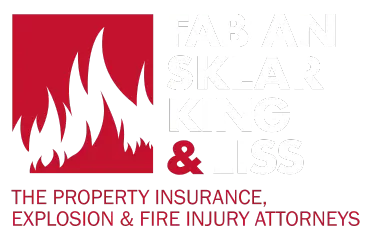MICHIGAN LAWYERS WEEKLY
Boutique firm marks 30 years of plaintiffs’ property damage cases.
For 30 years, a Metro Detroit law firm has been at the forefront of plaintiff’s-side insurance coverage, property damage, and fire origin and causation litigation.
The practice has staunchly stood for clients — whether homeowners or business owners — who have been treated unfairly by their insurance carriers following a catastrophe.
Three of its attorneys are certified fire investigators. Two of its partners made historic case law for people who are insured but are innocent of their co-insured’s bad acts.

But if you ask partner Michael H. Fabian what’s kept the boutique firm Fabian Sklar & King PC together for that long, he’ll reply, “Collegiality.”
“Forget about being lawyers and the practice,” he said from the firm’s Farmington Hills office. “You have to have a genuine like for each other. And if you do, you’ll work [things] out. You have to have a mutual respect for each other and not letting your ego get in the way. We think of the firm first and ourselves separately.”
Fabian said another reason he and fellow shareholders Stuart A. Sklar and Patrick A. King have been able to get to the three-decade mark as of this month is their staying true to the firm’s vision.
“You have to have a business plan and stick to it,” he explained. “You have to be dedicated to what your mark is in the industry and not be everything to everybody.
“There were many times when people came to us, wanting us to do other things, and we realized it might be attractive and we might be able to make money, but then you lose your identity as a boutique firm,” he added.
And the practice’s identity is made clear with its logo depicting the flames of a blaze.
‘Filling that void’
Fabian said he started the practice because he realized there were a lot of firms who represented insurance carriers in property damage cases, but not one that was specializing in plaintiff’s side.
So he spun off from another firm to start his own practice in 1986.
“My caseload got to the point where I felt there was a sufficient demand to start a firm doing only that and marketing ourselves as specializing in this area and filling that void,” Fabian, 63, said.

Sklar, meanwhile, was a year out of law school and happened to be handling similar cases.
“In that first year, I tried two civil arson jury trials in federal court, which convinced me this was what I wanted to do,” Sklar, 55, said. “So after that, I wound up getting married, came back from my honeymoon and decided I wanted to make a move. And I knew Michael had done this.”
Despite Fabian’s original firm partner’s splitting for the West Coast, Fabian told Sklar over breakfast that he wasn’t really in the market for a replacement.
“But I’d like to say I talked myself into a job,” Sklar said with a smile. “And the rest is history.”
As the firm developed, the two assumed responsibilities for particular kinds of cases. Fabian handled coverage issues and policy interpretations, while Sklar took on origin-and-cause matters.
“As a result of that, I wound up getting appointed to two committees of the National Fire Prevention Association, involving fire investigation,” Sklar said. “Then I was able to take the certification exam, which I passed.”
Sklar is a certified fire investigator, as is shareholder Patrick A. King, 64, who for 25 years had been a defense counsel for insurance companies.
“That’s how we go to know him,” Fabian said. “He was on the other side of a lot of cases. We had a great mutual respect. He came to us [in 2001], wanting to join us because he didn’t want to represent insurance companies anymore; he wanted to represent business owners and homeowners.”
The counsel count would later reach five when two more attorneys joined on — Jason J. Liss, also a certified fire investigator, in 2008, and Rabih Hamawi in April 2016.
The ‘Borman’ decision
Fabian and Sklar made case law when they argued a case before the Michigan Supreme Court concerning the “innocent co-insured rule.”
Fabian said the issue in Borman v. State Farm Fire & Casualty Co. (446 Mich. 482 (1994), 521 N.W.2d 266) was, if one person who’s insured engages in wrongdoing — such as intentionally starting a fire or committing some type of fraud — “how does that impact the rights of other people who are insured [under the policy] but did nothing wrong?”
Prior to Borman, Fabian said, courts across the nation had generally ruled that if one insured engages in fraud or a bad act, that would void the policy as to all insureds.
“Now [the other insured is] a victim of the bad act of someone who’s also on that policy,” he said. “And that’s a big issue. It comes up most often in a situation among spouses.
“Frequently, if there’s a divorce going on … during the course of divorce, the husband [burns] down the marital home when it was awarded to the wife. Under the policy, as it had been interpreted, that would mean the wife — who’s innocent of anything and is a victim of that act — would lose her insurance claim. She’s a double victim.”
Many experts and interest groups wrote amicus briefs for the case, citing spousal abuse matters as a primary factor for case law.
“Professors who deal with spouse abuse issues wrote how that was consistent with the psychology of domestic abuse,” Fabian said.
Writing for the 4-3 majority, Justice Charles L. Levin ruled that the fraud provision can only be enforced against the wrongdoer and not someone who was innocent of the wrongdoing. The case has since been cited in courts across the U.S.
“That was the first case in the country that reversed the trend on how the courts were ruling. We were able to show how the case law was using a theory that was inconsistent with the insurance codes,” Fabian said.
“Because of our experience with insurance, we were able to analyze a better way to argue the case and we used arguments that had not been used previously in presenting [similar] cases to various courts. It was a groundbreaking decision.”
Sklar added that the interesting part of that case was the claim involved less than $20,000.
“We knew this was an important issue. This wasn’t a case about making money; it was important for its legal” implications, he said.
Staying the course
As the firm has grown, so has its members’ expertise. The namesake partners have served as expert witnesses — even for defense in legal malpractice cases concerning insurance issues that lawyers allegedly mishandled.
Recently, the ATF commissioned Sklar to provide training for state and federal prosecutors in the organization’s programs.
And, Fabian said, they’ve gotten to know and depend on people in practice sectors different from their own.
“In representing a business, you’re involved with a lot of accounting issues and loss of business income claims, so they involve other disciplines,” he said. “We’ll bring in experts in related fields that we’ll use as expert witnesses, like calculating business income losses.”
But some losses can be tough for even the attorneys to bear, such as cases that involve deaths.
Sklar said he recalled two young brothers who perished in a fire while their father was helpless to save them.
“Every time I had to go take depositions on this case, I had to relive it,” Sklar said. “And it gets you thinking about your ownkids. It was just a horrible, gut-wrenching case.”
As part of its efforts to give back to the community, the firm donates smoke alarms annually to people who need them.
The namesake partners said that as they get older, they are realistic about business succession.
“We always said, ‘Stay the course and things will work,’” Sklar said. “We have a long-term view toward the future. Forget it being about us — it’s about the clients who are being treated unfairly by insurance companies. We want to keep the ability for people to have someone to fight for them, whether it’s against an insurance company or someone responsible for causing a fire or explosion.”
But Fabian said that just as important is communication, common goals and, of course, collegiality.
“Our personalities are very different but they complement each other,” he said. “There are times when one of us might have a more aggressive approach and we discuss things. We have a moderating impact on each other and we throw our egos off to the side.
“It’s not a matter of proving you’re right; it’s what is the best way to proceed. That applies not only to each and every case we have, it also applies to our approach to the firm.”
To read the article in Michigan Lawyers Weekly, click here.

